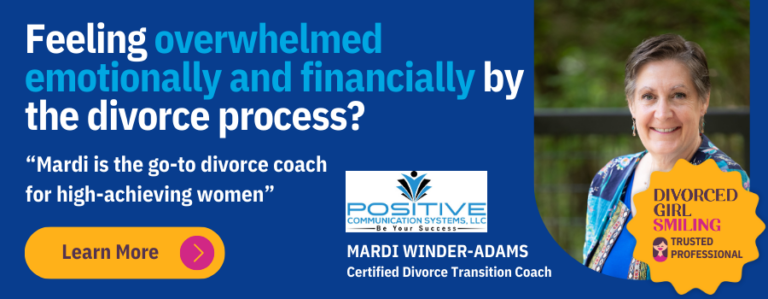The way we perceive and interpret our world is shaped by our values, beliefs, and past experiences, forming what is known as a mindset. During divorce, which we all know is a time of significant emotional and logistical upheaval, your mindset can either add to the stress or help you navigate the process with strength and resilience. There are 4 types of mindsets that will achieve the latter.
I work with individuals who are facing challenges in their divorce or who want to help mitigate potential problems with difficult partners or complex divorce situations. Often, the legal and financial issues are the focus, but without the right mindset, all that seems visible are the problems and challenges, not the possibility of solutions.
Changing your mindset is not something anyone but you can do, and it is your choice to hold onto or let go of those inner thoughts and beliefs that are holding you back, adding to your problems, or limiting your ability to see possibilities now and in the future.
While there are many different mindset approaches, here are 4 types of mindsets that have proven invaluable for my clients as they work through the challenges of divorce and prepare for the next chapter of their lives.
Embracing a Growth Mindset
Psychologist Carol Dweck defines a growth mindset as the belief that intelligence and abilities can be developed through effort and perseverance. When applied to divorce, this perspective encourages you to view challenges as opportunities to learn rather than as setbacks that define you.
With a growth mindset, you can reframe failures as stepping stones or learning insights and approach uncertainty with curiosity rather than fear. While the lessons may not be immediately clear, taking time to reflect on your experiences can reveal newfound strength and wisdom. A little bit of grace and recognition for your shifts and movement in how you think of situations is also a move towards a growth mindset.
To develop a growth mindset, start by viewing the divorce process as an opportunity for personal development rather than a failure. Explore new interests, take up a new hobby, or pursue a career shift that excites you. When negative thoughts surface, such as “I can’t do this,” consciously challenge them by asking yourself if there is real evidence behind that belief. Think of similar things you have done in the past, and apply those skills, talents, and abilities to your current issue. Replace these limiting thoughts with affirmations that reinforce your resilience and capability. Instead of focusing on obstacles, break challenges into small, actionable steps. Each step forward, no matter how small, builds confidence and fosters a sense of achievement.
Cultivating an Abundance Mindset
An abundance mindset is the belief that opportunities, resources, and support are available in limitless supply. In contrast, a scarcity mindset fosters fear and the belief that there is never enough—whether it’s money, love, or stability. A scarcity mindset causes you to hold on to everything for dear life, while letting go may be the option that provides leverage, opportunity, and personal peace through the divorce process.
Shifting toward an abundance perspective during divorce can help you recognize your own resourcefulness and trust that you are capable of rebuilding your life. Just because one door has closed does not mean others won’t open.
One way to cultivate an abundance mindset is by making gratitude a daily practice. Keep a journal where you list at least three things you are grateful for each day. This can help shift your focus from what is lacking to what you already have. Additionally, start visualizing the future you want to create. Imagine yourself thriving, living with confidence, and having everything you need to succeed. This mental exercise reinforces positive expectations and helps manifest new opportunities.
Finally, seek ways to share your time, knowledge, and support with others. Acts of generosity reinforce a sense of abundance and connection to the world around you. These acts can be as simple as holding a door open for a stranger, helping out a neighbor, or spending some time volunteering in your community.
Maintaining a Positive Mindset
A positive mindset does not mean ignoring hardships or pretending everything is always sunshine and roses. Rather, it is about resilience—the ability to face difficulties while believing in your capacity to overcome them. During divorce, this outlook is invaluable in helping you stay hopeful and proactive.
One practical approach to maintaining a positive mindset is building a strong support system. Surround yourself with people who uplift and encourage you, whether they are friends, family, a therapist, or a divorce coach. Engaging in regular self-care is another key component. Prioritize activities that nourish your body and mind, such as exercise, meditation, or engaging in creative outlets. When challenges arise, practice adaptability by reminding yourself that change is part of growth. Instead of fearing the unknown, view it as an opportunity to learn and evolve. Resilience is built through flexibility and an openness to new possibilities.
Shifting from a Victim to a Victor Mindset
It’s easy to feel powerless during divorce, especially when circumstances seem beyond your control. However, adopting a victor mindset that focuses on empowerment rather than defeat can transform your experience. This is a critical aspect of rebuilding your life when leaving a controlling or abusive relationship where you have been torn down and feel powerless and overwhelmed about being on your own.
Rather than dwelling on what is being lost, consider the opportunities divorce presents: a chance to redefine yourself, build a life that aligns with your values, and take ownership of your future.
When you catch yourself slipping into a victim mentality, consciously shift your focus to what you can control. Identify the choices you have in the present moment, whether that’s setting boundaries, making financial decisions, or choosing how you respond to challenges. Seek professional guidance where needed, whether through coaching, therapy, or financial planning, so that you feel informed and in charge of your future.
Final Thoughts
The beauty of mindset is that it is not fixed. You can reshape how you think and respond to any situation. By reframing your divorce through the lens of growth, abundance, positivity, and empowerment, you can change your experience and create a future filled with possibility. Divorce may be an ending, but it is also the start of a new beginning—one that you have the strength and resilience to navigate on your own terms.




















